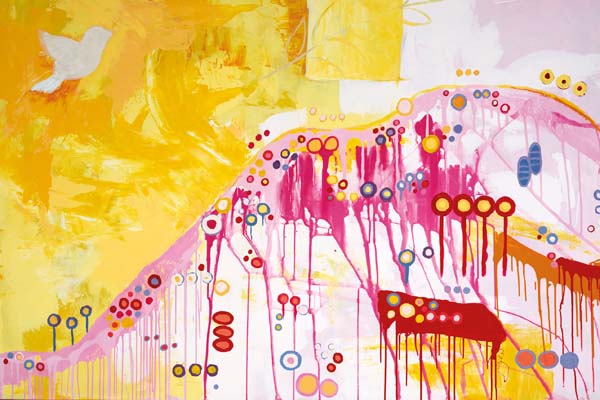A call to live as the greatest work of art
Nathan Brown
Book editor
Signs Publishing Company

This painting by co-convenor Joanna Darby graces the cover of Manifest: Our Call to Faithful Creativity.
In Art and the Bible, creative Christian thinker Francis Schaeffer put it like this: “No work of art is more important than the Christian’s own life, and every Christian is called upon to be an artist in this sense. He may have no gift of writing. No gift of composing or singing, but each man has the gift of creativity in terms of how he lives his life. In this sense, the Christian’s life is to be a thing of truth and also a thing of beauty in the midst of a lost and despairing world.”
It’s a reminder that we are called not just to doing creative things but to live creative lives, focused on the most important values, including truth and beauty. However, we cannot and should not try to deny that we live in a “lost and despairing world.” So much around us is broken. So many people are hurt. Violence and power grab the headlines. The problems and tragedies seem overwhelming. We can succumb to compassion fatigue and the paralysis of repeated pain. We are tempted to despair.
Paul responds: “Don’t let evil conquer you, but conquer evil by doing good” (Romans 12:21, NLT). This is a call to faithful creativity and imagination.
Art in all its forms can confront the brokenness and despair around us and within us, as well as creating beauty as an act of profound resistance and hope in the face of seeming hopelessness. We reject the voices that tell us what we see and feel are all there is and all that can be. Instead, we offer alternative and hopeful acts of imagination that begin to transform the world around us today, as well as pointing to our ultimate hopes about what our world will be and how our Creator will re-create.
And this is not only about art but about the faithful art of living well. We resist despair in our choices, actions, engagement, love and creativity, always seeking to overcome evil by doing good, by creating beauty, by practising hope.
This call to live our lives as our greatest work of art is daunting—until we recognise that even this work is one of collaboration with the Great Artist: “For we are God’s masterpiece. He has created us anew in Christ Jesus, so we can do the good things he planned for us long ago” (Ephesians 2:10, NLT).
The art of our lives is primarily God’s work, made possible by our collaboration with Him. Our best lives, our best creativity, are based on the grace, hope and love He offers us. The most profound truth and beauty we can imagine are found in His acts of creativity and re-creativity. Our invitation—and our most significant creative act—is to choose collaboration with the kingdom-building creativity of God in our lives and in our world.
Remarkably, our creativity is one of the ways He is at work in our world. Our most authentic and faithful creativity—in all its forms: life, relationships, good works, art, imagination and so much more—spring from our Creator, as do we ourselves, as His masterpieces of creativity. And when we acknowledge this inspiration and this source, the self-portraits our lives create become less about ourselves and more about Him, offered as creative acts of worship.
Adapted from Manifest: Our Call to Faithful Creativity, which editors Nathan Brown and Joanna Darby will launch at Manifest 2013.
![]() An arts festival hosted by Avondale is offering $5500 to those whose work best demonstrates faithful creativity.
An arts festival hosted by Avondale is offering $5500 to those whose work best demonstrates faithful creativity.
 Avondale College of Higher Education
Avondale College of Higher Education


